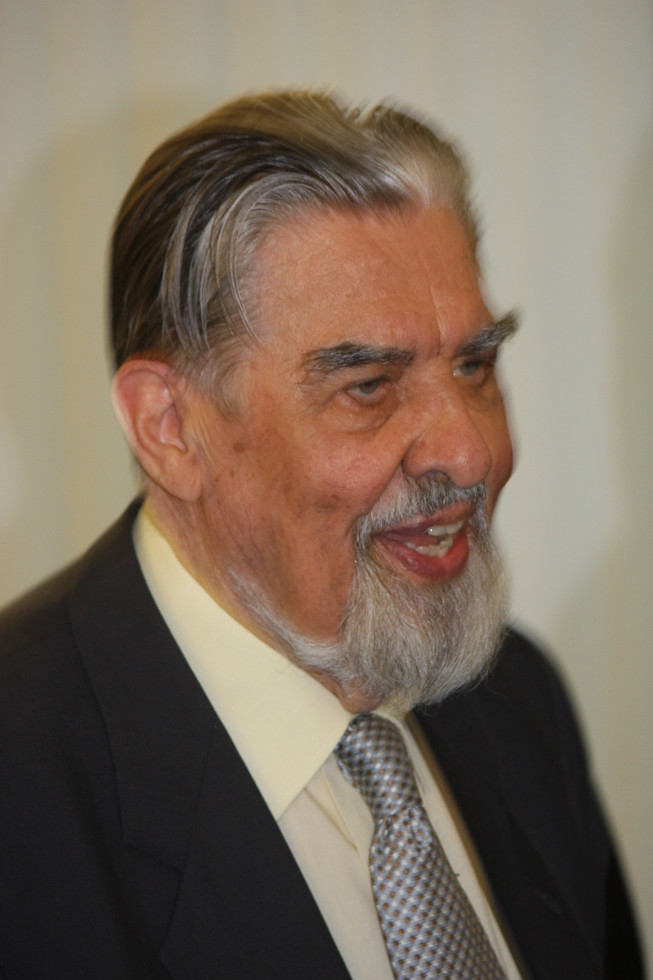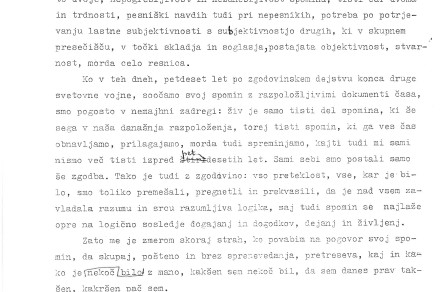Pondering at Republic Square on Sunday, May 14, 1995
Ljubljana, 1995
Typescript with handwritten corrections, 7 pages
Reference code: SI AS 2092, Zlobec Ciril, šk. 1

Ciril Zlobec (1925−2018) | Author Foto: Andrej Jakobčič via Wikipedia
»Memory plays an important role in characterizing a man. Without it, we would be pulled out of time and coexistence with other fellow men. And yet: we also speak of memory as faulty and unreliable. Who can with certainty differentiate one from the other? When can a man, in good conscience, swear to the validity of his memory while denying the validity of someone else’s?«
This insightful and enduringly relevant self-questioning opens this month’s archivalia; a typescript with handwritten corrections titled Pondering at Republic Square on Sunday, May 14, 1995, the day Ljubljana celebrated the 50th anniversary of the end of the Second World War. Its author is Ciril Zlobec, whose centenary we are also celebrating this year.
Ciril Zlobec was born on July 4, 1925, in Ponikve near Sežana. He was the youngest of seven children of Albert, a worker and a small farmer, and Antonija, a housewife. After attending Italian primary school in a nearby village of Avber, he completed the first few years of grammar school in Gorizia. He continued his studies at the seminary in Koper but was expelled from it for his “strong national consciousness”, after he was discovered writing poetry in the then forbidden Slovenian language. In 1942, after the outbreak of the Second World War, he joined the Liberation Front and the partisans operating in the Karst area. In March 1943, he and his comrades were confined in the Italian Abruzzo. After Italian capitulation in September 1943, he returned to Karst and joined the Kosovel Brigade, where he oversaw the organization of partisan schools. He lived to see the end of the war as a fighter of the IX corps in Trieste, where he was demobilized in September 1945.
In 1953, he graduated from the Faculty of Arts in Ljubljana with a degree in Russian and Slovenian language, after which he worked as a journalist and an editor. He was active in cultural editorial department of the newspaper Delo and of the Radio-Television Slovenia until 1986, when he concluded his career there as the editor-in-chief of the cultural and arts radio programming department. He was the editor of several literature journals, including Besede (1952-1957), and was the long-time editor of the journal Sodobnost (1969-1999). Beyond publishing, he was engaged in professional and academic organizations. In 1953, he became a member of the Slovenian Writers’ Associations, and from 1985 to 1986 he served as the president of the Yugoslav Writers’ Union, where he took a firm stand against the efforts to impose Serbian hegemonism. In 1985, he became the corresponding member of the Slovenian Academy of Sciences and Arts, in 1989, he became its regular member, and in May 1989 he was appointed its vice president.
His literary opus is extraordinary. He made his poetic debut very early on, but the turning point in his literary career came in 1953 with the publication of the joint collection of poems titled Pesmi štirih (with Janez Menart, Kajetan Kovič, and Tone Pavček). This was followed by many of his independent poetry collections, such as Pobeglo otroštvo (1957), Pesmi jeze in ljubezni (1968), Čudovite pustolovščine (1971), Nove pesmi (1985), Mojih sedemdeset (1995), and Čudež telovzetja (2004). He also wrote novels (Moška leta našega otroštva, 1962; Moj brat svetnik, 1970; Spomin kot zgodba, 1998), esseys (Poezija in politika, 1975; Slovenska samobitnost in pisatelj, 1986; Priznam, rekel sem, 1988) and a memoir Lepo je biti Slovenec, ni pa lahko (1992). In addition, he also translated, and his own works were translated into many foreign languages. For his achievements, he received many awards, including the Tomšič Award (1956), the Župančič Award (1976), and the Prešeren Award (1982).
Throughout his career, his creative and cultural work was closely intertwined with his pursuit of a more prominent social and political role. In 1944, he joined the Communist Pary of Slovenia. He served on the Central Committee of the League of Communists of Slovenia (1969-1978), was a delegate to the Assembly of the Socialist Republic of Slovenia (1969-1974), and participated in various commissions and boards, including the commission at the Central Committee of the League of Communists of Slovenia and the board of the Edvard Kardelj University. Between 1986 and 1989, he was the vice president of the republic conference of the Socialist Alliance of the Working People of Slovenia.
In 1989, he served as a member of the Presidency of the Socialist Republic of Slovenia, as the appointed representative of socio-political organizations. At Slovenia’s first democratic elections in April 1990, he was elected to the Presidency of the Republic of Slovenia, where he remained until 1992. During the process of gaining Slovenia’s state independence, he played an important role in discussions about the new constitution and was also among the signatories of the Basic Constitutional Charter on the Independence and Sovereignty of the Republic of Slovenia.
As a politician, he used his sharp but carefully considered critical mind to help create democratic processes and draw attention to national issues. He advocated for Slovenian cultural sphere, open electoral lists, and political reforms. At a crucial moment in our nation’s history, he played an important role in securing Slovenian independence and supporting the newly created state in its early years of sovereignty.
The Archives of the Republic of Slovenia pays special attention to collecting and preserving records related to Slovenia’s path to independence. One such important groups of records is the archival fonds of Ciril Zlobec (SI AS 2092), which includes essays, speeches, discussions, letters, published and unpublished articles, interviews, and various correspondence. The records cover subjects ranging from Zlobec’s early cultural and socio-political activities to various matters during Yugoslav period and the creation of the independent Republic of Slovenia. Among the records, we find documents such as his reflections on the significance of the celebration of April 27, the Day of Uprising Against Occupation, also records concerning the Liberation Front and partisan schooling, as well as documents from his time as editor of Sodobnost and president of the Yugoslav Writers’ Union. Other interesting documents deal with the complications in the national programmes initiated by France Klopčič, records on the school reform “against different national cores”, and correspondence with Dobrica Ćosić, Alojzij Šuštar, Anton Trstenjak, and Slobodan Milošević. A particularly important portion of the fonds relates to Zlobec’s time as a member of the presidency. Among them we can find records dealing with various cultural and socio-political issues, documents about the “wiretapping scandal”, as well as requests from people seeking assistance.
But let us return to the 50th (now 80th) anniversary of the end of the Second World War. In his text Pondering at Republic Square on Sunday, May 14, 1995, Zlobec accurately captured the spirit of the time, offering self-reflection and insightful analysis that continues to be relevant in today’s socio-political reality. Standing before the crowd, he asked questions about “the winners and the losers”, about whether a holiday serves to unite or divide Slovenian society. Among other things, he wrote:”I am aware that a celebration of victory should be more joyful and the thoughts pertaining to it more positive. And it is precisely this issue of a state that constitutes one of the major paradoxes of today’s Slovenian identity. We have our own state, acquired with arms and wisdom, and are rightfully proud of it and the fact that it has been recognized by the world. However, we still lack consciousness about a state. And it is the events taking place when celebrating the 50th anniversary of the end of the Second World War and victory over fascism that expose us before ourselves and before the rest of the world as being a divided community, one in which the fierce rivalry among political parties matters more than the respect of our common state and its democratic institutions.”
You can read more in the here presented archivalia of the month October.
Žiga Koncilija
- Fischer, Jasna (et al.): Slovenska novejša zgodovina: od programa Zedinjena Slovenija do mednarodnega priznanja Republike Slovenije: 1848−1992. Ljubljana: Mladinska knjiga, Inštitut za novejšo zgodovino, 2006, pp. 1026, 1167−1170, 1289, 1294, 1308−1309.
- Lah, Andrijan: Zlobec, Ciril (1925–2018). Slovenska biografija. Slovenska akademija znanosti in umetnosti, Znanstvenoraziskovalni center SAZU, 2013.
- Taškar, Jana, Pušenjak, Dejan: Proslave ob obletnici vojne posvečene tudi doseganju sprave. In: Delo, 15. 5. 1995, p. 1.
- Zlobec, Ciril: Spomin kot zgodba: avtobiografski roman. Ljubljana: Prešernova družba, 1998.


